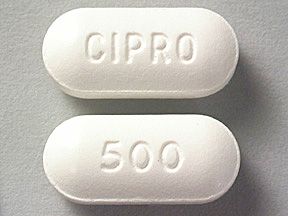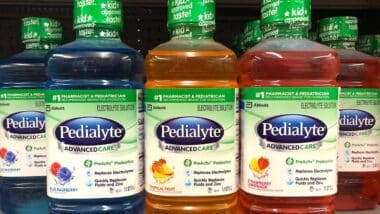 Among the most widely prescribed antibiotics in the world are members of the quinolone family, used to treat respiratory ailments and urinary tract infections (UTIs). Ciprofloxacin (Ciloxan Ophthalmic and cipro) is one of the most commonly prescribed quinolones, but it’s also known for adverse liver side effects.
Among the most widely prescribed antibiotics in the world are members of the quinolone family, used to treat respiratory ailments and urinary tract infections (UTIs). Ciprofloxacin (Ciloxan Ophthalmic and cipro) is one of the most commonly prescribed quinolones, but it’s also known for adverse liver side effects.
A group of synthetic antibacterial drugs, fluoroquinolones are the only antibiotics that act by inhibiting bacterial DNA synthesis, stopping “type II DNA toposiomerases (gyrases) that are required for synthesis of bacterial mRNAs (transcription) and DNA replication.”
Approved for use in 1990, Ciprofloxacin is an oral fluoroquinolone. Used to treat the usual bacterial infections, it is also used for infectious diarrhea, typhoid fever and uncomplicated gonorrhea. According to the National Institutes of Health website, “approximately 20 million prescriptions are filled yearly.”
Like all antibiotics, Cipro does have its list of side effects. The most common include headaches, rashes, gastrointestinal distress and allergic reactions.
Less common, and more dangerous, include photosensitivity, seizures, tendon rupture, and prolongation of the QT interval. It has also been tied to cases of hepatoxicity and acute liver injury. The cause, it’s believed, is due to hypersensitivity.
In the case of liver injury, according to the LiverTox website, the “time to onset is typically short (two days to two weeks) and the presentation is often abrupt with nausea, fatigue and abdominal pain, followed by dark urine and jaundice. The onset of illness also may occur a few days after the medication is stopped.”
Thankfully, if not fatal during the acute phase, full recovery is expected once the drug is stopped. Moreover, depending on the severity, recovery is usually rapid, taking two to four weeks.
A number of adverse reports and clinical cases of drug-induced liver injury have been submitted to LiverTox, a National Institutes of Health website that provides clinical and research information on drug-induced liver injury.
Most of the reference cases are from the Drug-Induced Liver Injury Network, while others were provided by website users who submitted data from actual clinical cases.
A percentage of individuals whose cases were reviewed reportedly developed ciprofloxacin-induced jaundice and hepatoxicity. In one case, “an 84-year-old female resident of a long term care facility received a course of ciprofloxacin for [a] urinary tract infection. Six days later she was found to have a rash and ciprofloxacin was stopped. Nevertheless, three days after stopping she was noted to be jaundiced. Serum bilirubin rose to as high as 8.2 mg/dL, but she recovered within six weeks.”
In another case, an 80-year old woman was reported with severe acute hepatitis after completing 10-days of ciprofloxacin therapy. With a past medical history laden with various illnesses, she worsened, and five weeks after the first signs of jaundice, she died.
For Bacterial Infections Only
Fluoroquinolones are meant to, and should be reserved to, treat bacterial infections only. The Infectious Disease Society of America usage guidelines, and doctors around the country, suggest minimizing the use of fluoroquinolones and other broad-spectrum antibiotics where not useful (like ear or sinus infections) to help prevent the development of superbugs.
Over the years, a number of available quinolones were taken off the market for potentially deadly adverse effects. Today, in addition to ciprofloxacin (Cipro), only five of them remain in use in the U.S. They are levofloxacin (Levaquin), moxifloxacin (Avelox), norfloxacin (Noroxin), ofloxacin (Floxin), and gemifloxacin (Factive).
Do YOU have a legal claim? Fill out the form on this page now for a free, immediate, and confidential case evaluation. The attorneys who work with Top Class Actions will contact you if you qualify to let you know if an individual lawsuit or class action lawsuit is best for you. [In general, quinolone lawsuits are filed individually by each plaintiff and are not class actions.] Hurry — statutes of limitations may apply.
ATTORNEY ADVERTISING
Top Class Actions is a Proud Member of the American Bar Association
LEGAL INFORMATION IS NOT LEGAL ADVICE
Top Class Actions Legal Statement
©2008 – 2025 Top Class Actions® LLC
Various Trademarks held by their respective owners
This website is not intended for viewing or usage by European Union citizens.
Get Help – It’s Free
Join a Free Quinolone Class Action Lawsuit Investigation
If you or someone you know took Cipro, Levaquin, Avelox or another quinolone antibiotic and were diagnosed with liver failure, Stevens Johnson Syndrome (SJS) or toxic epidermal necrolysis (TEN), you may have a legal claim. See if you qualify by submitting your information below for a free and confidential case review.
An attorney will contact you if you qualify to discuss the details of your potential case at no charge to you.
Oops! We could not locate your form.












